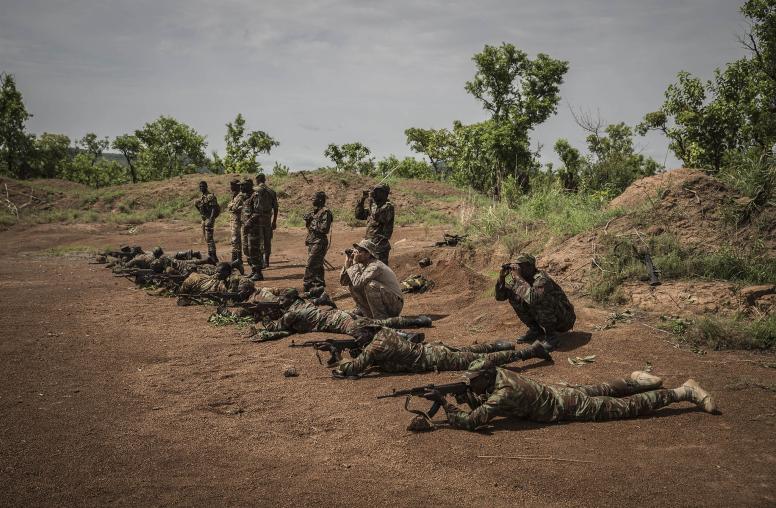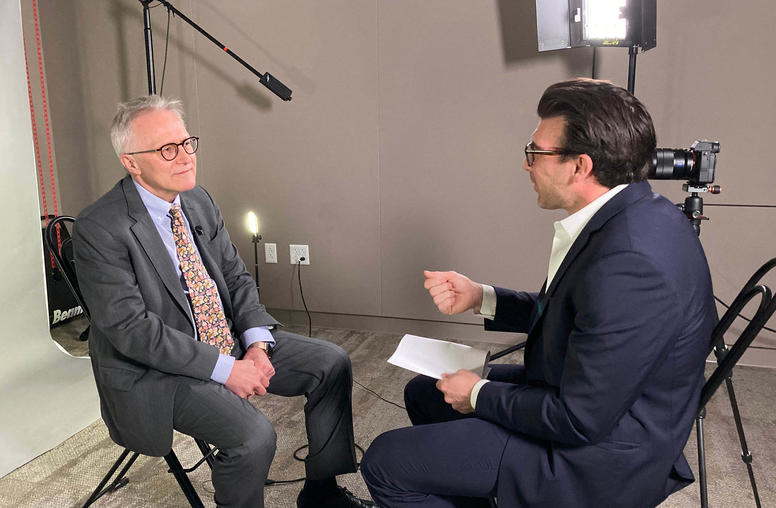Coastal West Africa Senior Study Group Final Report
Strategic Recommendations for Policies and Programs to Encourage Good Governance, Peace, and Stability
Executive Summary
The countries of Coastal West Africa are currently facing significant challenges to peace and security as extremist violence spills over from the neighboring Sahel region. Attacks in 2022 in the northern parts of Benin, Côte d’Ivoire, and Togo illustrate the immediacy and gravity of the threat, and governments across the subregion are grappling with protecting fragile communities in the north, addressing porous borders that facilitate attacks from neighboring states, and building the capacity of security forces to address the threat.

In light of these challenges and of the concern among policymakers in Washington and elsewhere to help the region navigate toward a more prosperous, peaceful, and democratic future, the United States Institute of Peace (USIP) convened a Senior Study Group from February through July 2022 to identify opportunities to advance security and stability in Coastal West Africa. Preceding this, in 2021, the Institute had begun consultations with West African civil society leaders and US government officials whose work focuses on that region. US officials invited USIP to share findings of these conversations as part of informing Washington’s development of policies and programs for the region.
US officials also invited USIP in 2022 to share its perspective on the US Strategy to Prevent Conflict and Promote Stability. This strategy is designed to implement the Global Fragility Act, an ambitious law enacted in 2019 that makes preventing conflicts and promoting stability a US foreign policy priority. The strategy focuses immediately on Haiti, Libya, Mozambique, and Papua New Guinea, along with five Coastal West African states—namely, Benin, Côte d’Ivoire, Ghana, Guinea, and Togo. The Senior Study Group regards the strategy as a unique opportunity to shape US policy not only in those five countries but also in the Coastal West Africa region as a whole.
The study group—made up of current and former policymakers, academics, business leaders, and representatives of international organizations—regards good governance as unquestionably the key to stability and peace in Coastal West Africa, a conviction that also underpins the new US strategy, as Secretary of State Antony Blinken emphasized in his speech on August 8, 2022, in South Africa. The study group views good governance as central to promoting the inclusive socioeconomic progress that is in turn critical to advancing political stability, security, and peace.
Yet economic dynamics are complex and difficult to influence, being affected by an array of regional and global factors that range from local markets to wars to climate change. Thus, the study group underlines the need to improve the economic prospects of Coastal West Africa but has eschewed offering specific prescriptions for economic interventions. Instead, the group emphasizes the need for all development partners to ensure that their activities center political stability and peace through the promotion of inclusive economic growth, which is dependent on good governance.
The study group also emphasizes that peace and security cannot be built solely through improved governance within Coastal West African countries. Attention must also be paid to the influential role of regional dynamics.
Seizing the extraordinary opportunity presented by the US Strategy to Prevent Conflict and Promote Stability demands high-level leadership within the US government, coordination within Washington and in the field, and the provision of resources beyond those identified to date. Furthermore, while many of the group’s recommendations are directed to the US government, they embody principles that are applicable to other international efforts.
Specifically, the study group calls for the following:
- Demonstrated, high-level commitment to building stability and peace in Coastal West Africa. The US government should make the Strategy to Prevent Conflict and Promote Stability a key topic at, and beyond, the US-Africa Leaders Summit in December 2022. The summit should include meetings by the president, the secretary of state, and other senior US officials with their counterparts from Coastal West Africa. The US government should devise ways to sustain its demonstrated commitment beyond the summit and throughout the strategy’s implementation.
- A senior figure in Washington to lead US efforts in Coastal West Africa. Responsibility for those efforts, and for keeping the region a US government priority, must rest with a senior policymaker, preferably at the level of undersecretary of state. Within that leader’s ambit, the State Department’s Bureau of Conflict and Stabilization Operations should collaborate with the State Department’s Africa Bureau, the US Agency for International Development (USAID), and the Defense Department on implementation of the new US strategy.
- Specifically assigned leadership and resources in the region. Ambassadors in the five Coastal West Africa countries identified in the strategy should make its implementation a priority for their missions. As part of this effort, they should work closely with their country teams (and in particular with bilateral and regional USAID directors). Given the importance of regional dynamics, the study group recommends the designation of a regional coordinator in the field. The imbalance of resources among the five US missions will require taking steps to ensure that posts with limited or no USAID presence are provided with adequate support.
- Consistent, more agile engagement of citizenries and communities in all efforts to foster peace and stability. All US activities should devote greater attention and resources to strengthening indigenous capacities that can be employed to improve governance and broaden economic prosperity. Adopting a whole-of-society approach, activities should engage civil society, including religious leaders and business and farmers’ associations. To empower local populations in shaping solutions, the US government should consider establishing an “Ambassador’s Conflict Prevention and Resilience Fund” to let chiefs of mission seize opportunities to help local groups advance the US strategy’s goals. This fund could be modeled on the Ambassador’s Special Self-Help program, which allows US ambassadors to provide seed money to local development initiatives. The Resilience Fund, however, would be streamlined bureaucratically, applying practices of the most agile US development funding in the region.
- Expanded engagement with fragile, poor, and isolated communities, particularly in areas that have suffered violence. This heightened level of engagement could include establishing a diplomatic presence in areas remote from Coastal West African capital cities—designating, as many embassies already do, officers and teams to cover a country’s northern and border regions with increasing USAID-supported programming, particularly programs designed to strengthen capacities of government institutions. This should be accompanied by redefining Defense Department programs to focus on institution building within security services and on improving accountability to civilian populations.
- Implementing all activities, including economic development, with an awareness of the need to promote peace and stability. Given the powerful roles that economic inequities and rent-seeking behaviors play in instigating instability and conflict, all economic development programs should be shaped to avoid these ills.
- A combined regional and country-by-country approach. The conflicts and instability within individual Coastal West African countries are connected to regional dynamics. Thus, all efforts should include high-level bilateral engagement with the political leadership of the respective countries, as well as with the Economic Community of West African States, including support for that group’s Accra Initiative for peace and security in the region. While the new US strategy engages five specific West African states, the US government and other partners should integrate their work in those countries with their efforts focused on other countries in the region, including Nigeria, Senegal, and Sierra Leone.
- Effective coordination of all initiatives in Coastal West Africa. The US government should coordinate its activities both among its own agencies and with its partners in the region. Within the US effort, the government should consider appointing a joint State Department–USAID strategic officer (reporting to the high-level policy coordinator) who would be responsible for the strategy writ large. While the lead responsibility for implementing the strategy in Coastal West Africa should be assigned to USAID’s Africa Bureau, the State Department’s Africa Bureau must also assume meaningful policy oversight, including from the assistant secretary and through the Offices of West African Affairs, Economic and Regional Affairs, and Regional Peace and Security. Clear guidelines should place the Defense Department in a supporting role in the strategy to ensure a coordinated, State Department–led “3D” (diplomacy, development, and defense) effort. Interagency coordination must occur both among bureaus and across the region, with teams assigned at each level. Regular interagency mission meetings at regional and country levels will be required to monitor implementation and improve strategies and programs; routine interagency meetings in Washington should also monitor and refine programs.
- Financial resources to match strategic ambitions. Coastal West Africa’s need for supportive partnerships exceeds the financial capacity of any donor, so the United States and other partners, including the European Union and many of its member states, must plan on sharing burdens. The portion of funding available under the Global Fragility Act—$200 million annually across the nine countries covered by the new US strategy—can serve at best as a catalyst for other investments. It will need to be combined with other resources, particularly because the US missions in Coastal West Africa, and across Africa as a whole, are understaffed and underresourced.
- A review by the United States and all its partners in Coastal West Africa of development assistance across the board to maximize the synergy of their work to help governments in the region meet their people’s needs. This assessment should avoid duplication of the efforts of development partners and seek to leverage what has been learned from previous programs. This broad assessment would include activities that are not focused narrowly on preventing conflict and promoting stability, including such US programs as Power Africa, the President’s Emergency Plan for AIDS Relief, the Security Governance Initiative, and USAID’s Disaster Assistance Response Teams.
Coastal West Africa Senior Study Group
Oge Onubogu, co-chair
Director, West Africa Program, United States Institute of Peace
Ambassador Terence McCulley, co-chair
Senior Visiting Expert, West Africa Program, United States Institute of Peace
Pauline Baker
President Emeritus, Fund for Peace; Senior Advisor on Governance, Creative Associates International
Ambassador Johnnie Carson
Senior Advisor to the President, United States Institute of Peace; Former US Assistant Secretary of State for African Affairs
Raymond Gilpin
Chief Economist and Head of Strategy, Africa Bureau, UN Development Programme; Former Dean of Academic Affairs, Africa Center for Strategic Studies
Ambassador Robert Jackson
Former US Ambassador to Ghana and Cameroon
James Kolbe
Former US Representative from Arizona; Senior Transatlantic Fellow, German Marshall Fund of the United States
Ambassador Deborah Malac
Former US Ambassador to Uganda and Liberia
Aïchatou Mindaoudou
Former Minister of Foreign Affairs, Republic of Niger; Former UN Special Representative of the Secretary-General for Côte d’Ivoire
W. Gyude Moore
Senior Policy Fellow at the Center for Global Development; Former Minister of Public Works, Republic of Liberia
Ambassador Tibor Nagy
Former US Assistant Secretary of State for African Affairs; Former US Ambassador to Guinea and Ethiopia
Leila Ndiaye
President and CEO, Initiative for Global Development; Former Senior Director of Policy for African Affairs, US Chamber of Commerce; Former Special Advisor to the Head of State, Republic of Côte d’Ivoire
Serge Thiémélé
Founder and Managing Partner, First Capital; Former President, US Chamber of Commerce in Côte d’Ivoire
Advisors
Richard Joseph
Non-Resident Senior Advisor, Africa Center, United States Institute of Peace
Joseph Sany
Vice President, Africa Center, United States Institute of Peace
Research Team and Secretariat
Horacio Trujillo
Facilitator and Writer, Independent Consultant
Afiwa Missoh, Jude Mutah, Matthew Reitman, and Katherine Todd
United States Institute of Peace
Members of the Coastal West Africa Study Group express their support for the general findings and recommendations the group reached but do not necessarily endorse every statement or judgment in the report. They participated in the study group in their personal capacities; the views expressed are their own and do not necessarily represent the views of their institutions or employers.




